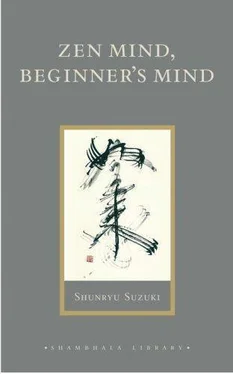When the alarm rings early in the morning, and you get up, I think you do not feel so good. It is not easy to go and sit, and even after you arrive at the zendo and begin zazen you have to encourage yourself to sit well. These are just waves of your mind. In pure zazen there should not be any waves in your mind. While you are sitting these waves will become smaller and smaller, and your effort will change into some subtle feeling.
We say, “Pulling out the weeds we give nourishment to the plant.” We pull the weeds and bury them near the plant to give it nourishment. So even though you have some difficulty in your practice, even though you have some waves while you are sitting, those waves themselves will help you. So you should not be bothered by your mind. You should rather be grateful for the weeds, because eventually they will enrich your practice. If you have some experience of how the weeds in your mind change into mental nourishment, your practice will make remarkable progress. You will feel the progress. You will feel how they change into self-nourishment. Of course it is not so difficult to give some philosophical or psychological interpretation of our practice, but that is not enough. We must have the actual experience of how our weeds change into nourishment.
Strictly speaking, any effort we make is not good for our practice because it creates waves in our mind. It is impossible, however, to attain absolute calmness of our mind without any effort. We must make some effort, but we must forget ourselves in the effort we make. In this realm there is no subjectivity or objectivity. Our mind is just calm, without even any awareness. In this unawareness, every effort and every idea and thought will vanish. So it is necessary for us to encourage ourselves and to make an effort up to the last moment, when all effort disappears. You should keep your mind on your breathing until you are not aware of your breathing.
We should try to continue our effort forever, but we should not expect to reach some stage when we will forget all about it. We should just try to keep our mind on our breathing. That is our actual practice. That effort will be refined more and more while you are sitting. At first the effort you make is quite rough and impure, but by the power of practice the effort will become purer and purer. When your effort becomes pure, your body and mind become pure. This is the way we practice Zen. Once you understand our innate power to purify ourselves and our surroundings, you can act properly, and you will learn from those around you, and you will become friendly with others. This is the merit of Zen practice. But the way of practice is just to be concentrated on your breathing with the right posture and with great, pure effort. This is how we practice Zen.
In our scriptures (Samyuktagama Sutra, volume 33), it is said that there are four kinds of horses: excellent ones, good ones, poor ones, and bad ones. The best horse will run slow and fast, right and left, at the driver’s will, before it sees the shadow of the whip; the second best will run as well as the first one does, just before the whip reaches its skin; the third one will run when it feels pain on its body; the fourth will run after the pain penetrates to the marrow of its bones. You can imagine how difficult it is for the fourth one to learn how to run!
When we hear this story, almost all of us want to be the best horse. If it is impossible to be the best one, we want to be the second best. This is, I think, the usual understanding of this story, and of Zen. You may think that when you sit in zazen you will find out whether you are one of the best horses or one of the worst ones. Here, however, there is a misunderstanding of Zen. If you think the aim of Zen practice is to train you to become one of the best horses, you will have a big problem. This is not the right understanding. If you practice Zen in the right way it does not matter whether you are the best horse or the worst one. When you consider the mercy of Buddha, how do you think Buddha will feel about the four kinds of horses? He will have more sympathy for the worst one than for the best one.
When you are determined to practice zazen with the great mind of Buddha, you will find the worst horse is the most valuable one. In your very imperfections you will find the basis for your firm, way-seeking mind. Those who can sit perfectly physically usually take more time to obtain the true way of Zen, the actual feeling of Zen, the marrow of Zen. But those who find great difficulties in practicing Zen will find more meaning in it. So I think that sometimes the best horse may be the worst horse, and the worst horse can be the best one.
If you study calligraphy you will find that those who are not so clever usually become the best calligraphers. Those who are very clever with their hands often encounter great difficulty after they have reached a certain stage. This is also true in art and in Zen. It is true in life. So when we talk about Zen we cannot say, “He is good,” or “He is bad,” in the ordinary sense of the words. The posture taken in zazen is not the same for each of us. For some it may be impossible to take the cross-legged posture. But even though you cannot take the right posture, when you arouse your real, way-seeking mind, you can practice Zen in its true sense. Actually it is easier for those who have difficulties in sitting to arouse the true way-seeking mind than for those who can sit easily.
When we reflect on what are doing in our everyday life, we are always ashamed of ourselves. One of my students wrote to me saying, “You sent me a calendar, and I am trying to follow the good mottoes which appear on each page. But the year has hardly begun, and already I have failed!’’ Dogen-zenji said,’ Shoshakujushaku.” Shaku generally means “mistake” or “wrong.” Shoshaku jushaku means “to succeed wrong with wrong,” or one continuous mistake. According to Dogen, one continuous mistake can also be Zen. A Zen master’s life could be said to be so many years of shoshaku jushaku. This means so many years of one single-minded effort.
We say, “A good father is not a good father.” Do you understand? One who thinks he is a good father is not a good father; one who thinks he is a good husband is not a good husband. One who thinks he is one of the worst husbands may be a good one if he is always trying to be a good husband with a single-hearted effort. If you find it impossible to sit because of some pain or some physical difficulty, then you should sit anyway, using a thick cushion or a chair.
Even though you are the worst horse you will get to the marrow of Zen.
Suppose your children are suffering from a hopeless disease. You do not know what to do; you cannot lie in bed. Normally the most comfortable place for you would be a warm comfortable bed, but now because of your mental agony you cannot rest. You may walk up and down, in and out, but this does not help. Actually the best way to relieve your mental suffering is to sit in zazen, even in such a confused state of mind and bad posture. If you have no experience of sitting in this kind of difficult situation you are not a Zen student. No other activity will appease your suffering. In other restless positions you have no power to accept your difficulties, but in the zazen posture which you have acquired by long, hard practice, your mind and body have great power to accept things as they are, whether they are agreeable or disagreeable.
When you feel disagreeable it is better for you to sit. There is no other way to accept your problem and work on it. Whether you are the best horse or the worst, or whether your posture is good or bad is out of the question. Everyone can practice zazen, and in this way work on his problems and accept them.
When you are sitting in the middle of your own problem, which is more real to you: your problem or you yourself? The awareness that you are here, right now, is the ultimate fact. This is the point you will realize by zazen practice. In continuous practice, under a succession of agreeable and disagreeable situations, you will realize the marrow of Zen and acquire its true strength.
Читать дальше


![Джон Харгрейв - Mind Hacking [How to Change Your Mind for Good in 21 Days]](/books/404192/dzhon-hargrejv-mind-hacking-how-to-change-your-min-thumb.webp)








